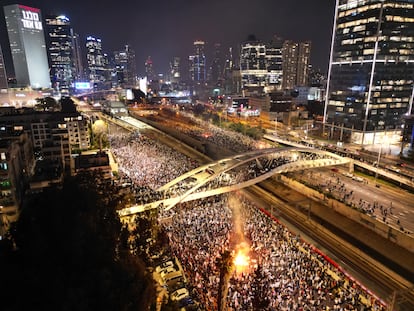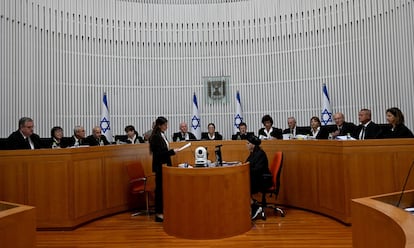Israeli Supreme Court overturns Benjamin Netanyahu’s judicial reform that sparked mass protests before the war
The resolution marks a new setback for the conservative prime minister, whose popularity has plummeted after his government failed to detect the October 7 Hamas attacks that led to the Gaza war

Until October 7, 2023 — the day Hamas attacked Israel, causing 1,200 deaths with the intelligence services failing to detect what was coming — the main political issue on the Israeli agenda was the judicial reform approved last July by Prime Minister Benjamin Netanyahu, with the support of his ultra-Orthodox and far-right political partners. On Monday, the Supreme Court overturned the law, which sought to prevent its judges from paralyzing government decisions they considered unreasonable.
The resolution, which had already been leaked to the media last Wednesday, deals Netanyahu a fresh blow at his lowest ebb. The latest polls show that social support has collapsed — the prime minister’s party, Likud, would today garner just half the number of deputies it currently has in the Knesset — due to the unpopularity of the reform and the government’s failure to prevent the massacre that sparked the war with Hamas.
The reform, which led to massive demonstrations throughout Israel last year, aimed to weaken the Supreme Court and remove its power to annul decisions made by the government, ministers, or elected public officials, one of the legal filters exercised by the highest judicial authority in a country that does not have a Constitution — it is instead guided by a series of basic laws developed over the years — and in which parliament elects the prime minister. The opposition views the Supreme Court as the guarantor of the separation of powers, while the right sees it as an ideological and interventionist body. The approval of the reform on July 24, 2023, was made possible by the votes of Netanyahu’s coalition (the right-wing Likud and the ultra-Orthodox and ultra-nationalists), while the entire opposition was absent from parliament. After the vote, Washington described the new legislation as “unfortunate.”
The court’s decision, which was not easily reached, opens a new front for Netanyahu. It marks the first time since the creation of the chamber, with the founding of Israel in 1948, that a resolution has been adopted by the 15 magistrates who form it. The ruling, as the leaks had anticipated, prospered with votes in favor from eight of them. The Supreme Court’s deliberations were held amid more or less veiled attacks from the government and other officials - who considered that the court did not have the power to overturn the law - and massive demonstrations by detractors calling for its repeal. The reform led to unprecedented polarization in Israeli society.
The Movement for Quality Government in Israel, the main promoter of the protests, has expressed its satisfaction with the ruling. “It is a historic day and a tremendous victory for those who stand for democracy,” that organization said in a statement. “A government and ministers who sought to escape judicial control have learned that there are judges in Jerusalem, that there is democracy, that there is separation of powers.” The movement’s director, Eliad Shraga, added: “The huge public campaign and the courageous opposition to these dangerous laws, and the protests and petitions before the Supreme Court, show the tremendous public power we have in our hands. We looked corruption in the eye and it lowered its gaze. We thank the court for this important decision. We will continue to do what is necessary to fix the country and preserve democracy.”

Government anger
Anger in the government was conveyed by Justice Minister Yariv Levin, who accused the judges of “arrogating all powers to themselves.” “The judges have taken into their hands all the powers of the state, which in a democratic system are distributed in a balanced way among the three powers,” said Levin, who is considered the main architect of the reform. “The Supreme Court has taken away the voice of millions of citizens,” he added. Netanyahu has stated that if the ruling was overturned he would not abide by the resolution, which would provoke a constitutional crisis unprecedented in Israel’s history. Likud criticized the decision and said that it opposes “the people’s desire for unity, especially during the war.”
It remains to be seen how Netanyahu will respond to the blow, but what is certain is that it comes when his popularity is at its lowest following the Hamas attacks of October 7. The latest poll, from a series of surveys conducted over the last few months and published by the Maariv newspaper last Thursday, gave the prime minister just 17 seats in the Knesset if elections were held today, compared to the 32 he currently holds. These polls also hand theoretical victory to the conservative National Unity Party of Benny Gantz, currently integrated into the emergency government Netanyahu formed to wage the war. The next general elections in Israel are scheduled for 2026.
The ruling also has a major impact on the war cabinet. Several of its members, all of them from the Gantz electoral list — including Gadi Eisenkot and Gideon Sa’ar — are among those who absented themselves from the vote last July. Yoav Gallant, the Defense Minister, publicly called for the withdrawal of the reform on national security grounds, for which Netanyahu threatened to dismiss him.
Opposing them, the Minister of Finance, Bezalel Smotrich, leader of the Religious Zionist Party, and Itamar Ben-Gvir, Minister of the Interior and head of the ultra-nationalists of Otzma Yehudit, back the reform. The two Cabinet members are also among those who want Israel to take control of Gaza after the conflict and resume building settlements. On Sunday, Ben Gvir went even further by calling for the passage of a national emigration law to remove Palestinians from the besieged territory and send them to third-party countries. U.S. President Joe Biden has called on Netanyahu to break his coalition partnership with these two formations.
Sign up for our weekly newsletter to get more English-language news coverage from EL PAÍS USA Edition
Tu suscripción se está usando en otro dispositivo
¿Quieres añadir otro usuario a tu suscripción?
Si continúas leyendo en este dispositivo, no se podrá leer en el otro.
FlechaTu suscripción se está usando en otro dispositivo y solo puedes acceder a EL PAÍS desde un dispositivo a la vez.
Si quieres compartir tu cuenta, cambia tu suscripción a la modalidad Premium, así podrás añadir otro usuario. Cada uno accederá con su propia cuenta de email, lo que os permitirá personalizar vuestra experiencia en EL PAÍS.
¿Tienes una suscripción de empresa? Accede aquí para contratar más cuentas.
En el caso de no saber quién está usando tu cuenta, te recomendamos cambiar tu contraseña aquí.
Si decides continuar compartiendo tu cuenta, este mensaje se mostrará en tu dispositivo y en el de la otra persona que está usando tu cuenta de forma indefinida, afectando a tu experiencia de lectura. Puedes consultar aquí los términos y condiciones de la suscripción digital.








































